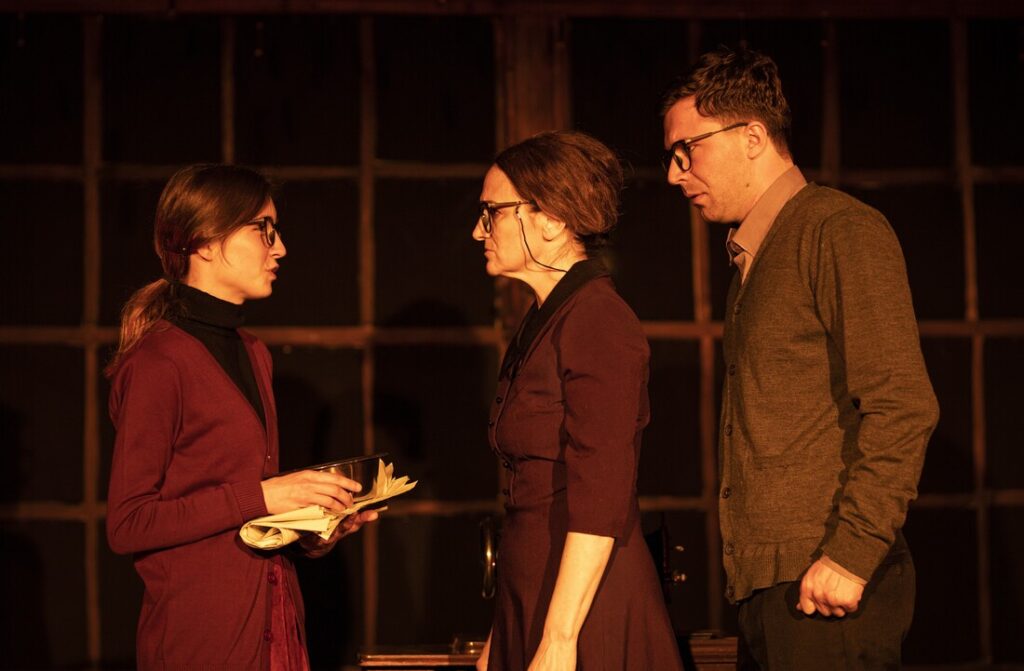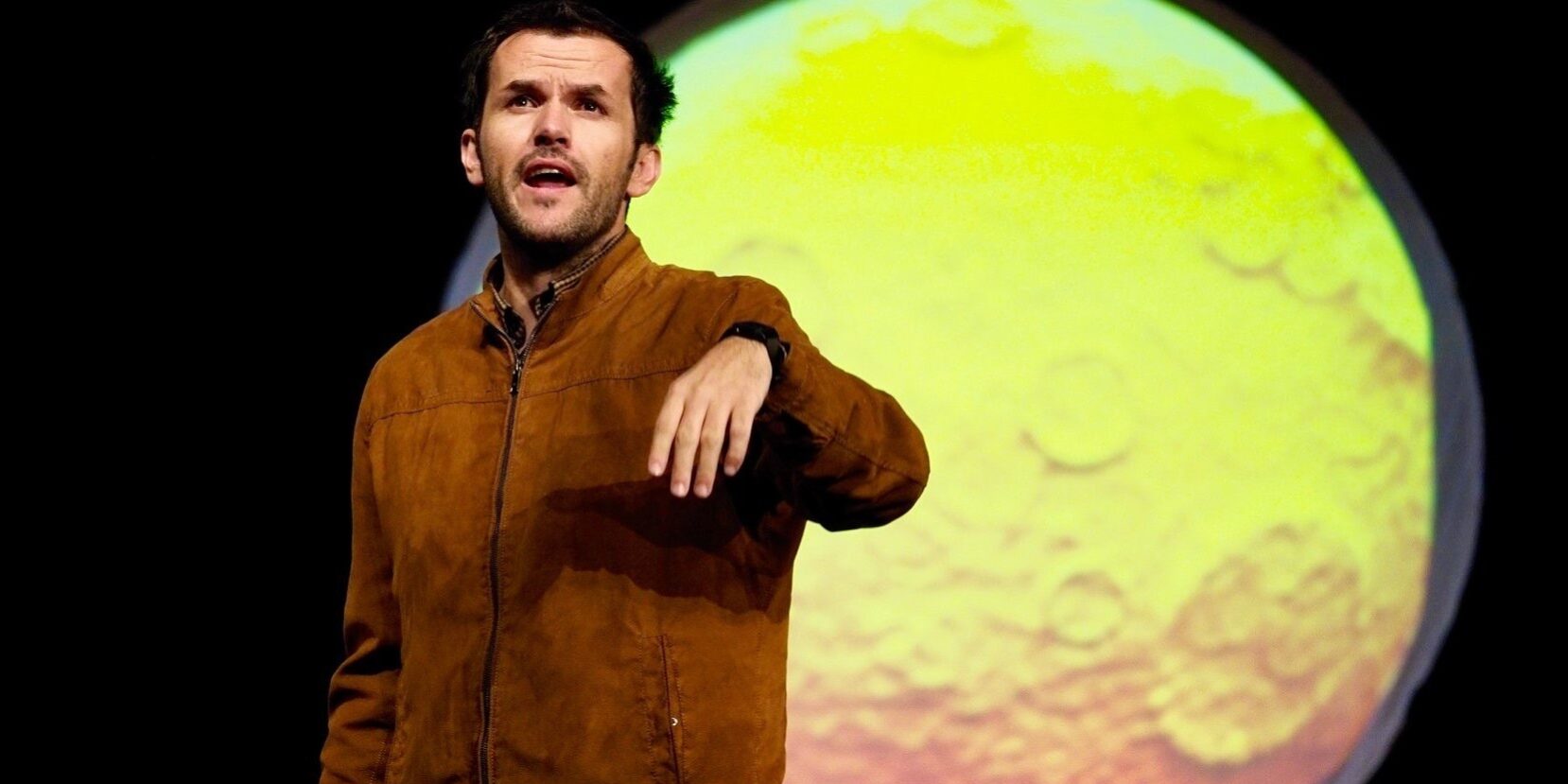Director and producer Kushtrim Koliqi talks to Nick Awde about fusing culture and activism via his work with Integra and the role theatre can play in addressing social issues in the region.
One of the defining factors of any functional society is how it cares for its collective memory and connects this to transparency. It goes without saying that culture in general and theatre in particular are key components of the toolkit for making sure that memory sticks. It’s rarely a straightforward process, and if the national and commercial sectors aren’t up to creating sticky theatre then that’s where the independents step in.
“I see plays and I can’t even remember what they’re about about a couple of years later,” says director and producer Kushtrim Koliqi. “So it is important to produce shows that are remembered. It’s problematic to fall in the trap of seeing theatre as part of the entertainment industry, something you consume only to relax. If somebody says, ‘oh I saw your play ten years ago’, that’s the impact I want to have. Theatre is a platform that needs to be used to address social issues, especially when you live in a troubled region like ours.”
As the head of Prishtina-based Integra, Koliqi is part of the region’s particular fusing of culture and activism by NGOs to create multi-layered – and often controversial – theatre ecosystem. Since its founding by young people in 2003, Integra focuses on areas such as human and minority rights, dealing with the past and transitional justice, education and awareness, and amidst an expanding gallery that includes audio narratives, exhibitions and films, Koliqi has also produced a trio of plays: Jeton Neziraj’s Father and Father (Babai dhe babai), about the missing from the Kosovo war, Doug Wright’s I Am My Own Wife (Unë jam vetë grua), about the life of transgender Charlotte von Mahlsdorf who survived the Nazi and Stasi regimes, and Doruntina Basha’s Stiffler, about sex workers and violence against women.
While, somewhat logically, the Integra plays have become festival staples, they are also small highly mobile productions that work close up with any audience in unexpected spaces such as Prishtina’s Ethnographic Museum and the Kosovan Parliament.
“Of course when we produce our own work it’s far easier to survive and to maintain those plays,” says Koliqi. “That’s a good portion of what I do, but I also work with the National and other theatres as an independent director. When they engage me it totally depends on their producers where the play can go.”
An upcoming example is the National Theatre’s planned dramatization of The Traitor’s Niche (Kamarja e turpit), the iconic 1978 novel by Albania’s Ismail Kadare. Approved by the National’s board, both Koliqi and writer Basha have been engaged to create a new production with rehearsals set for late 2023.
The project promises to reveal an intriguing slice of regional history that can be slotted into today’s memory banks. The narrative is set in the Ottoman Empire, during the early 19th century, and moves between Albania and Istanbul, centred on a courtier whose job is to transport to the capital the heads of the enemies of the sultan – the reformist Mahmud II. One of these heads belongs to the rebel Albanian governor Ali Pasha, echoing Hoxha’s break with the Soviet Union in the late 50s in reaction to both the latter’s destalinisation moves and rapprochement with Yugoslavia.
“It’s both a political play and a macabre one,” explains Koliqi. “The sultan kills everybody who is against him and then displays their heads in the main Istanbul market to show the people that this is what happens to anybody who goes against him. Doruntina and I are still discussing my vision for the production, but it has already triggered a lot in me about how the politicians in that period literally killed their opponents and then made a shopping centre the place of shame – the same place where you buy your jewellery or hats. So they kill you again with a crucifying cancel culture that creates a parallel with today.”

Stiffler – Integra
Koliqi’s methodology for finding those lights in the past to illuminate the present can go against expectations of how theatre should be made. “Those expectations are a huge debate not only in Kosovo but in other countries, and sometimes I find myself fighting it because I don’t agree with artists and directors who see the theatre and other forms of art only as aesthetic expression. Even if you do a cheesy comedy or drama you still have to have an agenda. Speaking for myself, I only work with agendas.”
The fact that Koliqi is so outspoken and uncompromising over his mission to push the agenda on stage has not stopped the National from seeking his services. He has previously worked at the theatre as a director and also as a board member, where he spoke up against attempts to depoliticise classic political pieces. George Orwell’s Animal Farm is one particular case that he vividly remembers. “For me it’s a huge problem if somebody directs a play like Animal Farm at the National Theatre and treats it only aesthetically. What the fuck? It’s a political play, how you can even think of not doing that?”
It’s not only script and staging that demand an agenda – cast, crew and creatives also need to bring something to the table. “My team cannot turn up as just talented actors or talented composers. We can’t talk on that level, we can’t just talk about technique. They need to be intellectuals too. I don’t see actors as tools, I see them as joint collaborators, like-minded people who can push that agenda. We first need to talk about content, and only then can we talk about how to craft solutions and make the decisions that we make as the result of the agenda that we share.”
It’s a disconnect that is a direct legacy of theatre throughout the region, when creative and critical thinking in communist times were discouraged, when art was led by dogma and permitted aesthetical elements so long as they were devoid of meaning.
“We’re still fighting that. I debate with people when they do a scene in a play and they don’t have an answer why they do it. You always have to ask yourself what is the impact? If you do something and it doesn’t transmit to the audience, it’s your problem. If you’re going to say, ‘Oh I’m putting 200 umbrellas into this scene’, well you need a purpose to do that.”
It goes beyond the stage itself, since everyone needs to be involved, even the critics. Praising the performance and design doesn’t dig deep enough, says Koliqi. “When we review a play we have to review based on its impact. If we lower the discussion to only the technical elements that shouldn’t be the point. In a way, things like costumes, lighting, scenery need to be almost invisible. Don’t say the production was amazing, say the impact was powerful.”
So it’s back to the idea of impact if we’re to have sticky theatre. Just as the case in the wider region, with every year passing in Kosovo memory risks not only losing its context but also the facts of its reality. The new generations say, why do we need to think about it? The old generations reply, why should we keep pushing it? And everyone in the middle ends up thinking, so why should we bother? The pressing challenge is how to restore those bridges of memory while they can still be built, be they war, communism, national identity.
“It’s clear that we miss the state/political will to deal with the past – and this includes documenting the past, documenting memory,” says Koliqi. “We are at the stage where our political stakeholders like to maintain this dogmatic memory – it’s not evidence-based or research based memory. They can put out numbers like 20,000 women were victims of sexual abuse – of course we need to know this, but they state it without any reference or context. This is very much what me personally and Integra are engaged in, dealing with the past and with transitional justice. But it still needs to be the state’s job.
“When you read the history textbooks, they are biased with that kind of mono-ethnic based dogma, full of hate. You see it in the media and the discourse of our politicians, both government and opposition. Of course we are small in comparison, but we do the plays, we do oral history projects, documentation – we have impact. So when it comes to that sticky element I think we have that.”
Integra breaks down the bubbles that people live and work in by investing in R&D, a process that helps its theatre pieces to join up collective memories of past national trauma by using the tool of present personal trauma, documented and performed. Stiffler sums up the grim heritage of men’s violence against a sex worker by following the line “you are neither the first nor the last”, while I Am My Own Wife criticises Kosovo’s modern society by spotlighting transgender issues in venues like the Centre for Cultural Decontamination in Belgrade as part of Mirëdita, Dobar Dan!

Father and Father – Integra
The play Father and Father views the missing through their families still coming to terms with the loss, and this was the Integra play that was invited to perform in Parliament, for the National Day of Missing Persons [27th April]. It’s a good example of how to put something into the mainstream to sell Koliqi’s agenda – and it has become one of the major theatre events of the last couple of years.
“We have to mainstream our agenda, not to make it cool for 20 people in a dark room,” says Koliqi, and Integra reinforces this in other ways, such as putting on an exhibition, Living with the Memories of the Missing, in Parliament itself. As the director adds: “It’s not common in the Balkans to impose yourself in the mainstream media, but through the mainstream media you target mainstream people, the people who are not the converted.”
There will always be friction of course. In 2021, for example, Integra found itself in a stand-off with public broadcaster Radio Kosova over a series of audio dramas, directed by Koliqi, where ten episodes narrate the stories of raped women while another ten narrate the stories of the families of missing persons.
“Radio Kosova started broadcasting the episodes, then suddenly called us and said they were stopping it. We asked why and found out that the reason was an episode about a Kosovo Serb woman. They only wanted Albanian stories. We created a huge fuss and they were obliged to continue broadcasting.”
Along with Serbia’s Youth Initiative for Human Rights and Civic Initiatives, Integra also organises Mirëdita, Dobar Dan! (meaning ‘good day’ in Albanian and Serbian), a festival across both countries that promotes reconciliation between Serbs and Kosovo Albanians.
“When we take the festival to Belgrade there are protests like bomb threats, but in Kosovo they usually just call us spies and collaborators. However this year it was even more overwhelming because the tragedy of the school shooting in Serbia had just happened on 3rd May. We opened the programme the next day with Radivoje Andrić’s film Si mësova të fluturoj (How I Learned to Fly), and before it started we invited all the audience for a one-minute silence for the children – 300-400 people who included ministers of the current government. Then we invited everyone after the film to stand in front of the National Theatre to light candles for the children.
“People attacked us over this, saying things like ‘you have Serbian blood’. We don’t care because we see this festival as the only small window that shares art in solidarity, that is evidence-based and follows the new political realities as a channel of communication between two countries and two societies. So these are sticky elements too.
“We have to make things stick. Nobody has documented the massacres from the 90s to include all the civilians who were killed, so Integra started a project two years ago to do this and we already have the methodology to make it work. And if we’re faced with a couple of generations of people who just read stupid history textbooks filled with the wrong information, then we accept that’s also our challenge. We are criticising things and we have a voice, we have a clear role to play when it comes to dealing with the past and transitional justice in Kosovo.”
For more information, visit: NGO-Integra.org
Further reading: review of Father and Father
Further reading: review of Stiffler
Nick Awde is a journalist, playwright, editor, critic and producer. Based in the UK, he is co-director of Morecambe's Alhambra Theatre. Books include Equal Stages (diversity and inclusion in theatre), Mellotron, Women In Islam, and translations of plays by other writers. Much of his work focuses on ethnoconflict and language/cultural genocide.








